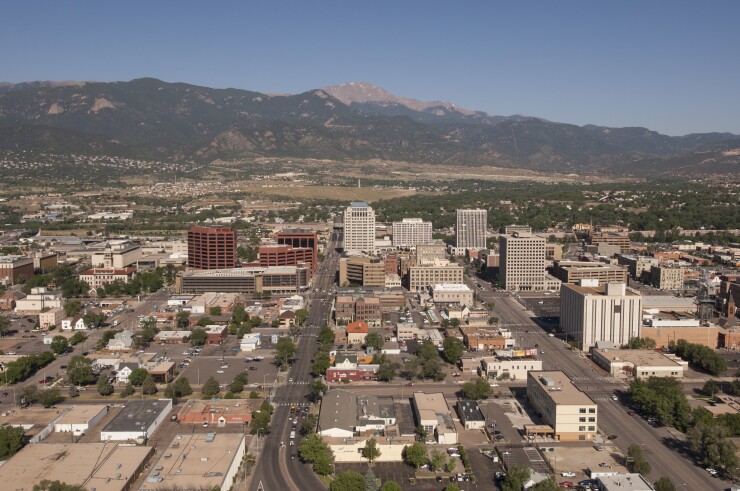No matter who's doing the talking, Colorado Springs' red-hot housing market is expected to continue to sizzle next year, and possibly beyond.
A forecast by Realtor.com, the California-based online real estate service, ranks the Springs as No. 7 among the nation's top 10 housing markets for 2020.
At the same time, a report by the National Association of Realtors lists Colorado Springs as one of the 10 housing markets that will outperform the rest of the nation over the next three to five years.
Both reports say a strong local economy and job growth will help fuel home buying and selling in Colorado Springs, while it's also an area that is considered relatively affordable and drawing newcomers who feel priced out of other markets.

The Realtor.com report rates Boise, Idaho, as the nation's No. 1 housing market for 2020. Other markets ahead of Colorado Springs were, in order, McAllen-Edinburg-Mission, Texas; Tucson, Ariz.; Chattanooga, Tenn.; Columbia, S.C.; Rochester, N.Y.
The Springs was followed in the Realtor.com rankings by Winston-Salem, N.C.; Charleston-North Charleston, S.C.; and Memphis, Tenn.
In addition to strong economies and job creation, Realtor.com noted that all but one of its top 10 markets were inland and away from the East and West Coasts, a sign that buyers are looking to more affordable, amenity-filled areas.
In its thumbnail look at Colorado Springs, Realtor.com lauded the Springs for "an outstanding quality of life with low living costs and easy access to the Rocky Mountains. Colorado Springs has a strong job market and a highly educated workforce in aerospace, defense, cybersecurity and technology ... Colorado Springs has become a great alternative for those priced out of Denver."
The National Association of Realtors, meanwhile, identified its top 10 metro areas for housing based on several factors, including numbers of people moving into the markets, housing affordability for new residents, consistent job growth compared with the national average and home price appreciation.
In addition to Colorado Springs, the Realtors Association's top 10 markets, in alphabetical order, were Charleston, S.C.; Charlotte, N.C.; Columbus, Ohio; Dallas-Fort Worth; Fort Collins; Las Vegas; Ogden, Utah; Raleigh-Durham-Chapel Hill, N.C.; and Tampa-St. Petersburg, Fla.
"Some markets are clearly positioned for exceptional longer term performance due to their relative housing affordability combined with solid local economic expansion," Lawrence Yun, the National Association of Realtors' chief economist, said in comments accompanying the group's report.
The top 10 ratings by Realtor.com and the National Association of Realtors aren't a surprise to some Colorado Springs real estate agents, who've seen another year of strong sales and record high prices in 2019. Through November, home sales in the Colorado Springs area were close to 15,000 and running slightly ahead of last year, while monthly prices set record highs on five occasions this year.
In addition to a strong local economy and job creation, Colorado Springs is seeing several new businesses and expansions to go with the addition of amenities such as the U.S. Olympic & Paralympic Museum and a multi-use stadium in downtown, said Eddie Hurt, an agent with ERA Shields Real Estate.
A new Interstate 25 interchange at Powers Boulevard that began construction last week, meanwhile, will be a critical addition on the city's north side, he said.
And while Colorado Springs has been seeing homebuyers from Denver over the last few years who have been looking for less expensive homes, some of those buyers now are also being attracted by the Springs' quality of life, he said.
Still, Colorado Springs' housing market has its issues, too.
Although the Realtor.com and National Association of Realtors reports point to the availability of housing, the Colorado Springs area continues to wrestle with an extremely tight inventory. The strong demand, combined with a shortage of properties for sale, has sent prices soaring.
"We need more homes on the market, more houses to sell," Hurt said.
Most Realtors would prefer to see annual price appreciation of 3% to 5%, but prices have instead increased in the 7% to 10% range — and that's "not healthy," Hurt said.
"It's getting too expensive in terms of wage growth," Hurt said. "People can't afford those homes. ... The last three or four years, home prices are going up faster than people's salaries."
Another concern: investors who are snapping up multiple homes that they rent out on a short-term or long-term basis, which denies buyers a chance to purchase, he said.
"That's hogging up a lot of that inventory for people who want to buy," Hurt said.




